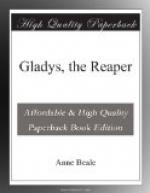‘I’d scorn to fawn on any one, Howel,’ says Netta indignantly; ’I never did in my life. I always gave Miss Rice Rice as big a stare as she gave me.’
‘You will be able to give her a bigger now,’ laughs Howel. As they journeyed on, Howel pointed out all the different objects that were likely to interest his mother and Netta. Every one, or nearly every one, knows what an exciting event is a first journey to London, it matters not whether performed at eighteen or sixty-five. And if the first journey to London be also the first journey by rail, the wonder and excitement are doubled.
When Howel had finished all his instructions concerning the future, he thoroughly entered into the present, and enchanted his companions by his general knowledge of the passing scenes, and the amusing stories he had to tell. Netta was more in love with him than ever before they reached town, and wondered that such a grand and clever gentleman could have kept constant to a little country cousin like herself. She had seen nothing of Howel during the most stirring years of his life, and could not have supposed what a change the mere commerce with the world could effect. She considered him far more agreeable than her brother Rowland, handsomer and more polished than Sir Hugh Pryse, and much more fashionable than Mr Rice Rice.
At Swindon he treated them liberally, and loaded Netta with sweets to take with her to the carriage after she had swallowed her cold chicken and wine. As to his mother, knowing her peculiar tastes, he gave her a glass of brandy and water, upon plea of illness, which she took with evident pleasure; but fearing to attract the attention of the smart people around her, sipped so daintly, that it was not half finished when the signal to return to the carriages sounded, and Howel hurried her off.
’Just let me put this piece of chicken and ham into my bag, Howel, and finish this drop,’ she whispered.
‘Quick, mother, not a minute,’ was all the answer she received, accompanied by a pull of the sleeve so imperative, that she was obliged to leave her half filled glass behind her.
At the Oxford Station, Netta began to wonder what Rowland would think of her conduct.
‘Think!’ said Howel, with a scowling brow, ’the prig! what right has he to think? He will know that three or four thousand a-year are somewhat better than a London curacy—ha! ha! and wish himself in my place, I fancy,’
As they neared London, Netta was haunted by visions of her brother, the only person she really feared.
’Suppose he should meet them! should find her out! Suppose the clergyman who married them should guess, from her name, she was his sister, and go and tell him?’
Howel laughed heartily at this, told her to look out of the window at London as they entered it, and see whether she thought one parson would be likely to be met by chance by another.
‘This London!’ exclaims Netta, ’I see nothing but the roofs of a lot of ugly black houses!’




